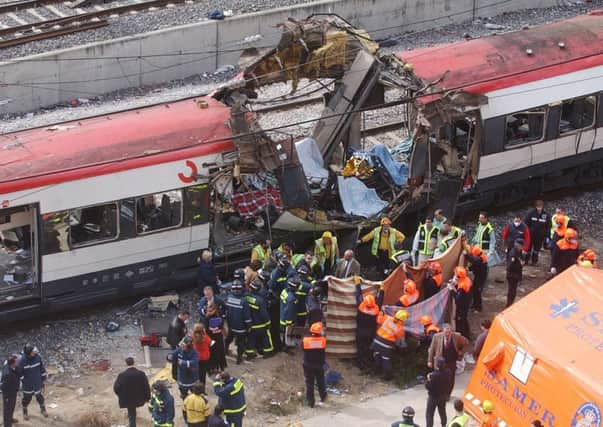On this day: 200 die in commuter train bombings in Madrid


1618: Margaret and Philippa Flower were burned at the stake in Lincoln for witchcraft. They put a curse on the man who convicted them, Judge Charles Holiment, who, when he heard about it, could not stop laughing and died in a hysterical fit.
1669: In one of the most violent of Mount Etna’s 250 recorded eruptions, a two-mile-wide river of lava poured towards Catania, 18 miles away. Citizens built a 60ft high wall to check the flow, but molten lava poured over the top, killing 20,000 people.
Advertisement
Hide AdAdvertisement
Hide Ad1682: The Royal Chelsea Hospital for Soldiers (Chelsea Pensioners) was founded by King Charles II. It was built by Sir Christopher Wren and opened in 1692.
1784: British signed peace treaty with Tippoo of Mysore in India.
1794: The Theatre Royal, Drury Lane, London, opened.
1845: Maoris staged further uprisings against British rule in New Zealand.
1917: British forces captured Baghdad.
1920: Emir Feisal proclaimed King of an independent Syria.
1925: The musical comedy No No Nanette was premiered at the Palace Theatre, London, with Binnie Hale playing Nanette.
1935: The German air force, the Luftwaffe, was created by proclamation of Hermann Goering.
1938: German forces entered Austria.
1941: The United States Lend-Lease Bill was signed by president Franklin D Roosevelt. It enabled Britain to borrow millions of dollars to buy food and arms needed for the Second World War.
1942: General Douglas MacArthur pulled out of the Philippines as Japanese advanced, uttering the immortal words: “I shall return.”
1943: British Eighth Army repulsed heavy German counterattacks in Tunisia.
Advertisement
Hide AdAdvertisement
Hide Ad1945: The huge Krupps factory in Germany was destroyed when 1,000 Allied bombers took part in a daylight raid.
1969: Golda Meir became prime minister of Israel. She resigned in 1974.
1985: The Al-Fayed brothers won control of the House of Fraser Group to become owners of Harrods.
1988: The Bank of England pound note, first introduced on 12 March, 1797, ceased to be legal tender in Britain at midnight. When the deadline for returning old notes was reached, it was estimated that some 70 million were still outstanding.
1989: An East German and his wife died trying to cross the Berlin Wall in a hot air balloon.
1990: Lithuania became the first Soviet republic to seek secession from the Soviet Union after declaring itself a sovereign state.
1990: Chile’s General Augusto Pinochet bowed out as president after 16 years of dictatorship.
1991: Pro-democracy activists in Kuwait demanded that the country’s government set a date for parliamentary elections.
Advertisement
Hide AdAdvertisement
Hide Ad2004: Two hundred people died when a series of bombs ripped through rush-hour trains at stations in Madrid. Al-Qaeda later claimed responsibility.
2011: An 8.9-magnitude earthquake off the coast of Japan triggered a ten-metre tsunami, killing more than 13,000 people.
ANNIVERSARIES:
Births: 1885 Sir Malcolm Campbell, holder of world land and water speed records; 1911 Sir Fitzroy Maclean, diplomat, soldier, politician and writer; 1916 Lord (Harold) Wilson of Rievaulx, prime minister 1964-70 and 1974-6; 1952 Douglas Adams, author (The Hitch Hiker’s Guide to the Galaxy).
Deaths: 1820 Sir Alexander Mackenzie (of Dunkeld), explorer of North America; 1955 Sir Alexander Fleming, discoverer of penicillin; 1997 Big Daddy (Shirley Crabtree), wrestler; 2007 Betty Hutton, film actress